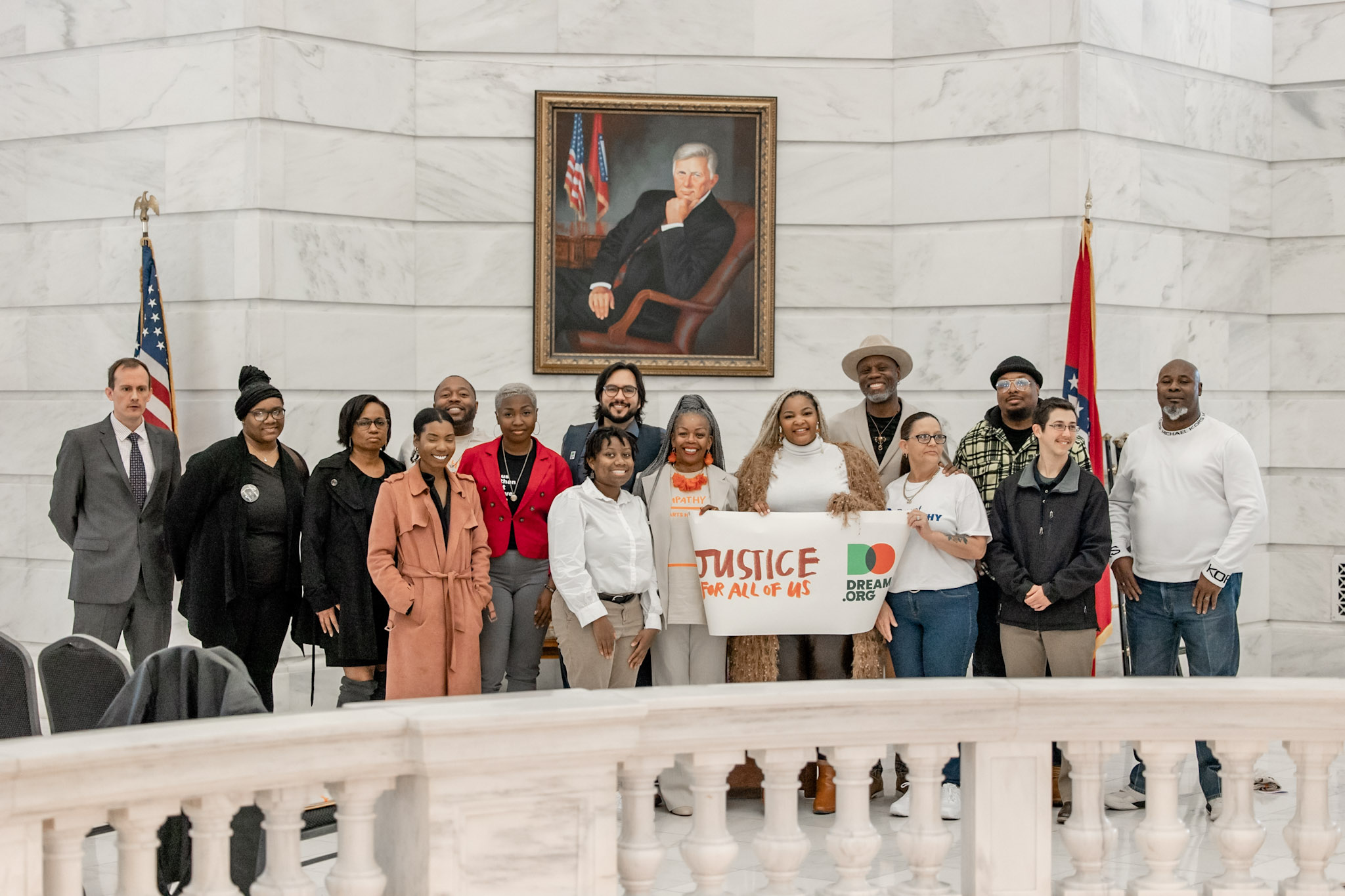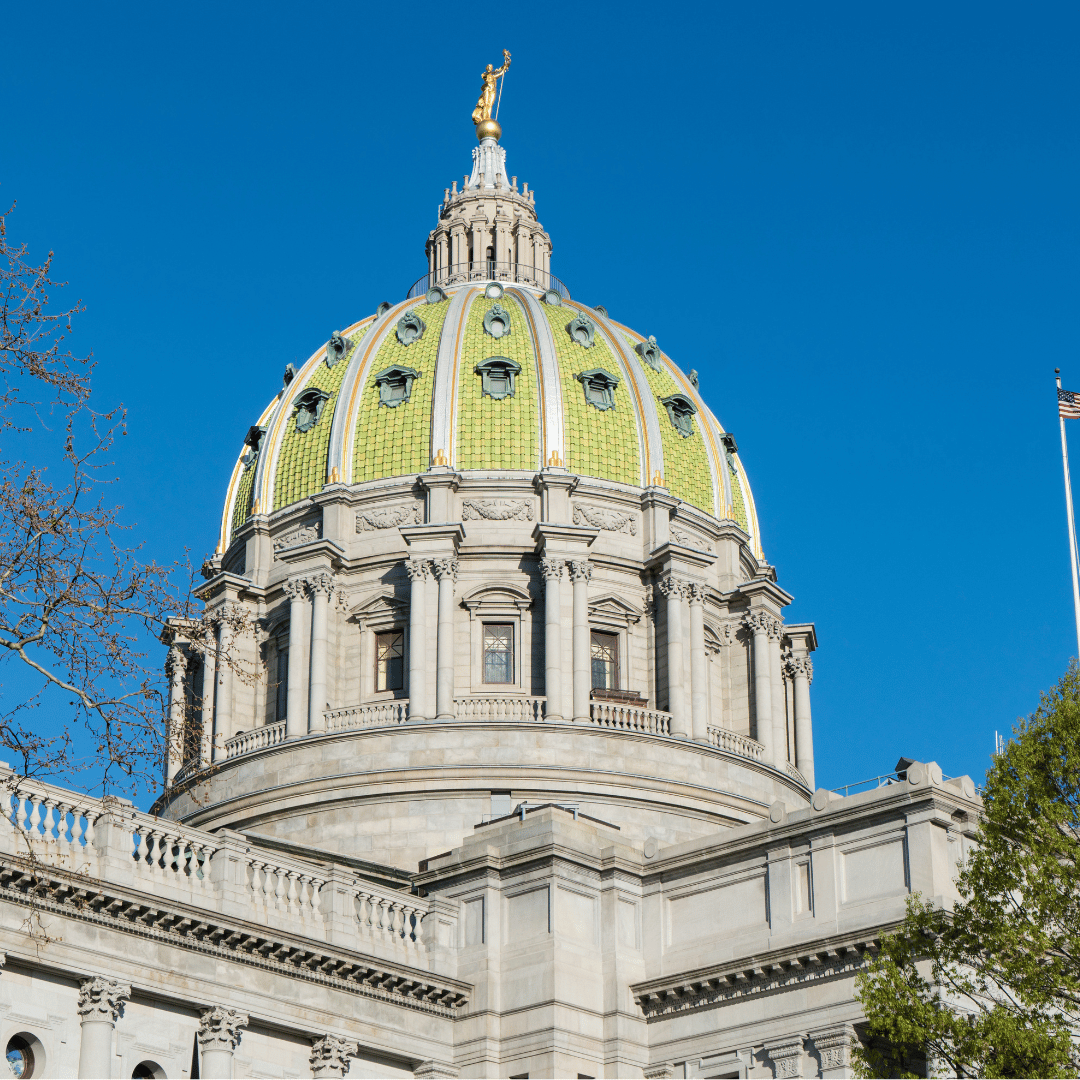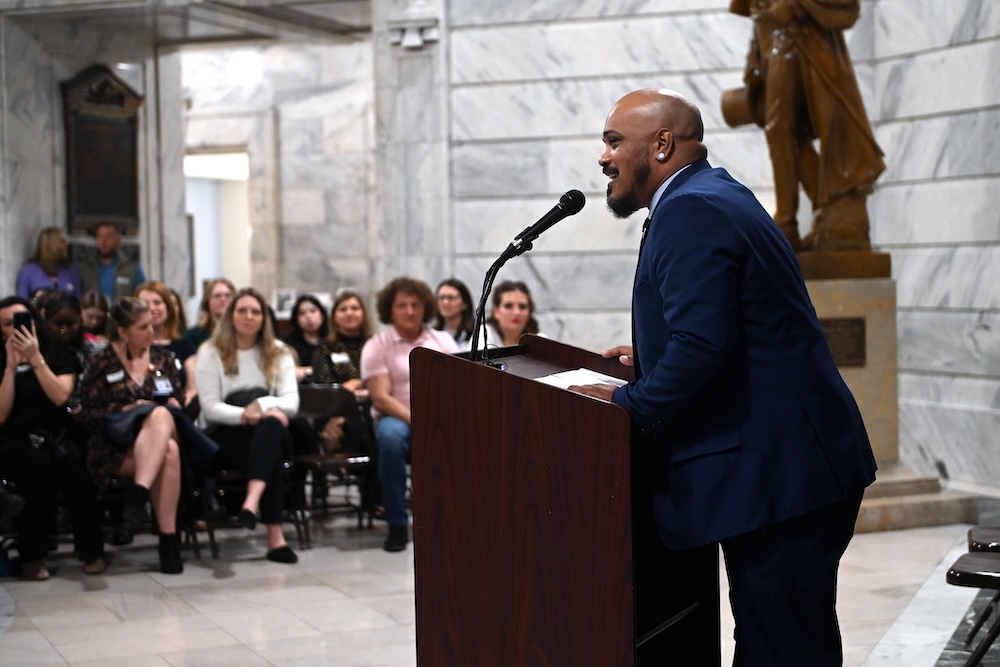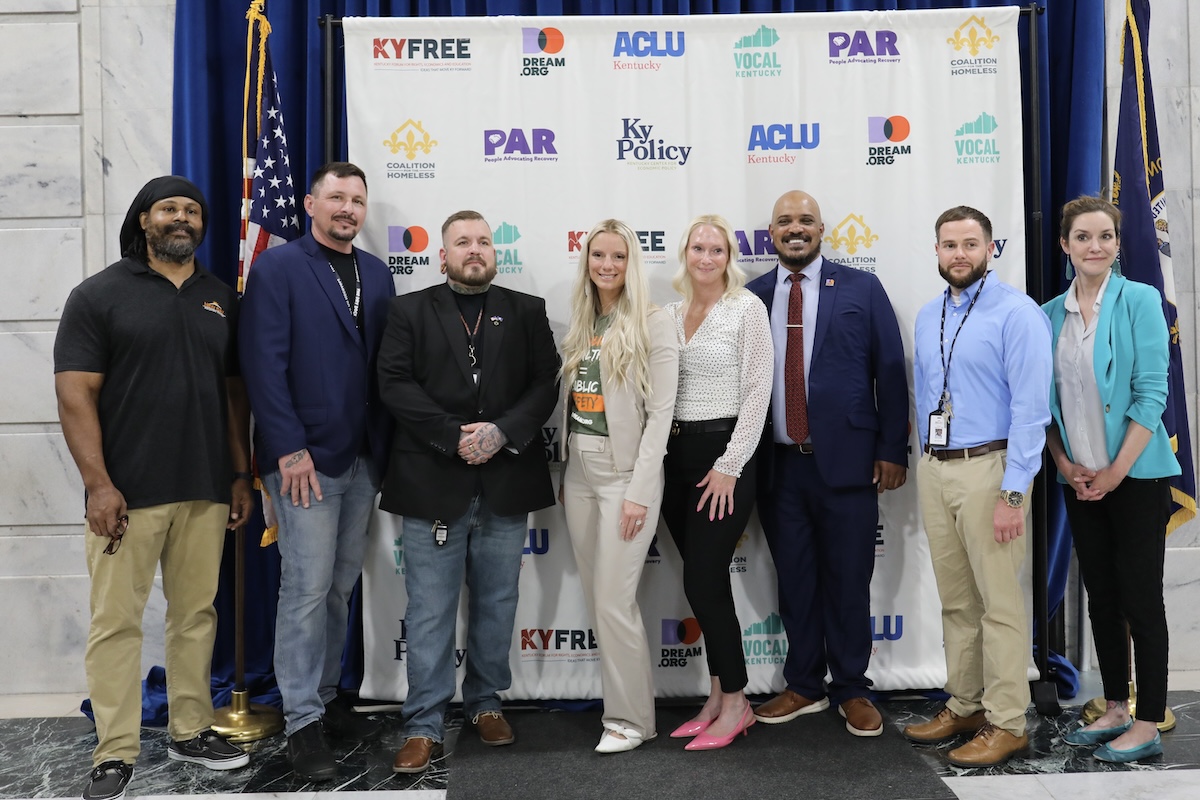Justice State Campaigns

The most powerful voices in the fight for criminal justice reform are often those most impacted by the broken system.
We bring together leaders impacted by the criminal legal system with unlikely allies spanning the political divide to push for bold and innovative solutions. We build consensus for reform among Republicans and Democrats at the state and local level, because we believe that creating common ground for criminal justice reform can lead to more durable change.
In 2025, our leaders in Arizona, Arkansas, Kentucky, Wisconsin, Missouri, Washington, and Pennsylvania are working to pass state-level legislation and building a grassroots movement to dismantle the harsh, inhumane, and unjust policies and practices in the criminal justice system.
This is a critical time and we need everyone to fight back against the rise in hostility towards criminal justice reform. Get involved in one of our state campaigns to create second chances and a future without mass incarceration.

Each state campaign is led and selected by our Empathy Network leaders. We believe community leaders are the most equipped to pick issues that are most urgent and important to their communities, rather than having us prescribe which reforms they should work on. Our state campaigns are reflective of the diverse criminal justice movement including working on policies ranging from sentencing, parole, juvenile justice, prison conditions, expungement, fines & fees, and public health.
Through our Dream Justice Cohort we invest in leaders across the country and we especially invest in states where criminal justice reform is historically difficult to pass.
Our program works–our trained Empathy Network leaders have gone on to pass 6 state bills including states like Kentucky and Mississippi. Our leaders have also helped reform women’s prisons across 13 states.
In collaboration with our system-impacted Empathy Network leaders and local advocacy organizations, we organize the annual Day of Empathy –the nation’s largest distributed days of action for criminal justice reform. Every year we bring over 1,000 community members together to participate in grassroots lobby days and interactive workshops and discussions to drive meaningful change.


Arizona’s prison system costs taxpayers over $1.5 billion annually and is responsible for the health and safety of over 34,000 incarcerated people and thousands of corrections staff. However, this system continues to have problems and lacks meaningful oversight. Lawmakers and families still struggle to get answers about what happens in state prisons, while people inside endure dangerous conditions of confinement, inedible food, unclean water, crumbling infrastructure, unsafe working and living conditions, and constitutionally inadequate medical and mental health care.
The Independent Correctional Oversight bill will increase the accountability and transparency at the Arizona Department of Corrections, Rehabilitation, and Reentry by establishing an independent ombudsman’s office with the power to inspect prisons, recommend and monitor improvements to prison conditions and facilities, and help resolve prisoner, staff, and family concerns. The bill will also form a correctional oversight committee that holds public meetings, selects the ombudsman, and makes recommendations.
Get in contact with our Empathy Network Leader: Kara Janssen at karaeleese30@gmail.com

Arkansas ranks 48th in the nation for youth mental health, yet the state has prohibited expanding or building new psychiatric residential treatment facilities (PRTFs) since 2008. This ban has made it harder to meet growing mental health needs, especially during crises like the COVID-19 pandemic.
When youth experience a mental or behavioral health crisis, they need treatment and support—not punishment. Arkansas is the only state with such a restriction, while others are removing barriers to psychiatric care. We’re working to repeal these outdated laws to expand access to quality, affordable mental health treatment—because youth deserve care, not incarceration.
We’re also working on reforming Arkansas’s driver’s license laws. Over 32,000 Arkansans have lost their driver’s licenses due to unpaid fines or missed court dates—not for dangerous driving. This policy makes it harder for people to work, care for their families, and pay off their debts, ultimately hurting our economy. Repealing reinstatement fees would remove an unnecessary barrier to employment, helping Arkansas families stay financially stable while boosting workforce participation and economic growth.
Get in contact with our Campaign Manager: Ruby Welch at ruby@dream.org

Currently, an estimated 1.3 million adults in Kentucky have a record. That's 38% of adults who are denied fair opportunities to employment, housing, education, and more, solely because of an arrest or conviction on their record. The Kentucky Clean Slate Act would provide a path for more than half a million people to have their records fully cleared – and that's because they have earned it by completing their sentences and remaining crime-free. Automating record clearance would help working families and businesses in Kentucky by expanding the pool of talented workers.
Clean Slate laws have been adopted by twelve states so far, and families, communities, and economies across the country are benefiting. Now, it’s time for lawmakers in Frankfort to ensure Kentucky isn’t left behind.
Get in contact with our Empathy Network Leader: Selena Coomer at selena@lane13consulting.org

What would you do to stay out of prison? For many so called “informants” the answer is to send an innocent person instead.
Far too often, an informant invents testimony that could risk an innocent person’s liberty. 60% of overturned convictions are due to false testimony. Imagine the despair of being imprisoned for a crime you didn't commit, or the helplessness of watching a loved one endure that nightmare. Prison informants can serve as a valuable tool in the search for justice. But without legislation that requires informant-derived evidence to be validated, they can also cause grave injustices.
That's where the Informant Transparency Act comes in. It dismantles the cycle of deceit that fuels wrongful convictions in Missouri. The bill mandates detailed recording and monthly reporting of informant use to ensure transparency.
Let’s protect innocent people from a wrongful conviction based on false testimony.
Get in contact with our Empathy Network Leader: ML Smith at mojusticecoalition@gmail.com

Enacted in 1988, the Thurmond Amendment excludes individuals with drug distribution convictions from Fair Housing Act protections, creating a lifetime barrier to housing stability for millions.
Over 72,000 people in Pennsylvania have been convicted of drug manufacturing offenses since 1988 and are now denied Fair Housing protections. 33% of all Pennsylvania drug distribution convictions have resulted in no prison time, yet the Thurmond Amendment imposes lifetime housing barriers on these individuals.
This collateral consequence has disproportionately impacted marginalized communities, perpetuating systemic inequities and limiting opportunities for economic mobility. The Fair Future Act would repeal the Thurmond Amendment and impact thousands of Pennsylvania’s lives by restoring fair housing protections.
Get in contact with our Empathy Network Leader: Yusuf Dahl at yusufsdahl@gmail.com

Imagine if today, you were being incarcerated longer than someone who committed the same crime, for something you did as a youth.
In 2023, the Washington State Legislature agreed that using prior juvenile convictions to calculate longer sentence lengths for adults was unjust. Now, we're asking the Washington State Legislature to finish the job by passing the Retroactive Relief for Unjust Juvenile Sentence Calculation bill, therefore providing sentencing relief for people already subjected to this unjust practice.
Our leaders are also working on passing the Judicial Discretion Act, which would allow judges to reduce peoples’ long sentences if their incarceration no longer benefits the public.
This bill aligns with research showing that people who are granted early release before finishing lengthy sentences are less likely to recidivate, that people age out of crime, and that overcrowded and understaffed prisons generate less public safety.
Our work promotes racial justice - nearly 1 in 4 individuals serving very long prison sentences are Black, while Black people make up less than 5 percent of the population. And Washington incarcerates Native people at more than 6x the rate of White people.
Get in contact with our Empathy Network Leaders: Youngblood at eugeneyoungblood60@gmail.com and Alex Mayo at alex@wavoices.org

The Reentry Success and Responsibility Act and the Safe Supervision Act aim to break the toxic and harmful cycles of Supervision as it stands here in Wisconsin.
The Reentry Success Act eliminates incarceration for technical violations, allowing individuals to stay in their communities and reducing prison overcrowding. The Safe Supervision Act caps supervision terms at five years, reducing unnecessary violations and promoting stability.
These reforms address systemic barriers and prioritize rehabilitation, helping to end cycles of incarceration and build a fairer, more equitable justice system for families in Wisconsin.
Get in contact with our Empathy Network Leader: Gabi Hart at bhart@icstars.org



